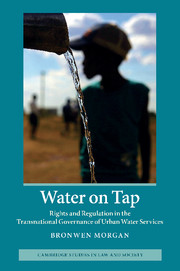Book contents
- Frontmatter
- Contents
- List of figures
- List of tables
- Acknowledgements
- Introduction: The field of global water policy: struggles over redistribution and recognition
- 1 Rights, regulation and disputing: a conflict-centred approach to transnational governance
- 2 Managed liberalisation and the dual face of French water services provision
- 3 ‘Another world is possible’: Bolivia and the emergence of a participatory public provision model for access to urban water services
- 4 Regulatory arbitrage and popcorn politics: contrasting disputing pathways in Argentina and Chile
- 5 Moonlight plumbers in comparative perspective: electoral v. constitutional politics of access to water in South Africa and New Zealand
- 6 Law's work: legality and identity in transnational spaces
- Epilogue
- References
- Index
- CAMBRIDGE STUDIES IN LAW AND SOCIETY
Epilogue
Published online by Cambridge University Press: 03 May 2011
- Frontmatter
- Contents
- List of figures
- List of tables
- Acknowledgements
- Introduction: The field of global water policy: struggles over redistribution and recognition
- 1 Rights, regulation and disputing: a conflict-centred approach to transnational governance
- 2 Managed liberalisation and the dual face of French water services provision
- 3 ‘Another world is possible’: Bolivia and the emergence of a participatory public provision model for access to urban water services
- 4 Regulatory arbitrage and popcorn politics: contrasting disputing pathways in Argentina and Chile
- 5 Moonlight plumbers in comparative perspective: electoral v. constitutional politics of access to water in South Africa and New Zealand
- 6 Law's work: legality and identity in transnational spaces
- Epilogue
- References
- Index
- CAMBRIDGE STUDIES IN LAW AND SOCIETY
Summary
This book has made three core empirical arguments. First, in the Introduction and Chapter 1 I argued that urban access to safe drinking water is a policy problem that has an increasingly important global dimension, which is illuminated by understanding it in terms of rights and regulation. This perspective helps to trace emerging cross-border patterns of activity without losing sight of the way that these activities are still embedded in, and shaped by, particular national political and cultural contexts.
Second, Chapters 2 and 3 argued that two primary models have emerged in the global policy field as responses to the problem of access to water services in urban settings, each rooted in a particular national setting. France is emblematic of the managed liberalisation model while Bolivia has been a crucial site for the emergence of a public participatory model. However, as shown in Chapters 4 and 5, as aspects of the public participatory model are institutionalised at the micro level, they tend to be colonised by managed liberalisation.
Third, socio-economic rights and ‘community control’ are commonly invoked in efforts to hold back this colonising tendency, but there are a number of challenges in retaining a political–critical edge to these strategies. Their relationship to law and legality is a site of particular interest in this respect, as explored in Chapter 6, and illuminates different kinds of hybrids between managed liberalisation and public participatory governance.
- Type
- Chapter
- Information
- Water on TapRights and Regulation in the Transnational Governance of Urban Water Services, pp. 201 - 203Publisher: Cambridge University PressPrint publication year: 2011

